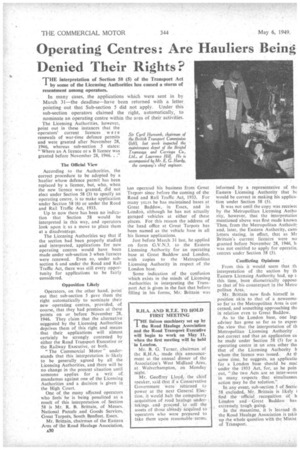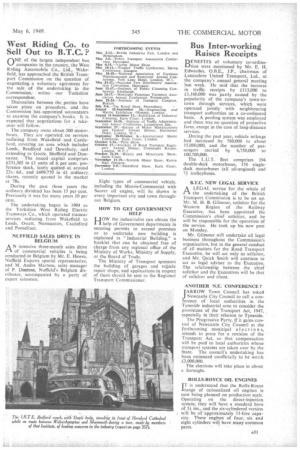Operating Centres: Are Hauliers Being Denied Their Rights?
Page 4

Page 5

If you've noticed an error in this article please click here to report it so we can fix it.
THE interpretation of Section 58 (5) of the Transport Act by some of the Licensing Authorities has caused a storm of resentment among operators.
In many cases, the applications which were sent in by March 31—the deadline—have been returned with a letter pointing out that Sub-section 5 did not apply. Under this sub-section operators claimed the right, automatically, to nominate an operating centre within the area of their activities.
The Licensing Authorities, however, point out in these instances that the operators' current licences were renewals of war-time defence permits and were granted after November 28, 1946, whereas sub-section 5 states: "Where an A licence or a B licence was granted before November 28, 1946. .."
The Official View According to the Authorities, the correct procedure to be adopted by a haulier whose defence permit has been replaced by a licence, but, who, when the new licence was granted, did not elect under Section 58(3) to specify an operating centre, is to make application under Section 58 (6) or under the Road and Rail Traffic Act, 1933.
Up to now there has been no indication . that Section 58 would be interpreted in this way, and operators look upon it as a move to place them at a disadvantage.
The Licensing Authorities say that if the section had been properly studied and interpreted, applications for new operating centres would have been made under sub-section 3 when licences were renewed. Even so, under subsection 6 and under the Road and Rail Traffic Act, there was still every opportunity for applications to be fairly considered.
Opposition Likely
Operators, on the other hand, point out that sub-section 5 gave them the right automatically to nominate their new operating centres, provided, , of course, that they had premises at these points on or before November 28, 1946. They claim that the alternative suggested by the Licensing Authorities deprives them of this right and means that their applications will almost certainly be strongly contested by either the Road Transport Executive or The Railway Executive, or both.
"The Commercial Motor" understands that this interpretation is 'likely to be generally agreed by all the Licensing Authorities, and there will be no change in the present situation until someone applies for a writ of mandamus against one of the Licensing Authorities and a decision is given in the High Court.
One of the many affected operators who feels he is being penalized as a result of this interpretation. of Section 58 is Mr. R. B. Brittain, of Messrs. National Parcels and Goods Services, Great Tarpots, South_ Benfleet. Essex.
Mr. Brittain, chairman of the Eastern Area of the Road Haulage Association,
A30
has operated hIs business 'from Great Tarpots since before the coming of the Road and Rail Traffic Act, 1933. For many years he has maintained bases at Great Baddow, in Essex, and in London, although he has not actually garaged vehicles at either of these places. For this reason the address of the head office at Great Tarpots has been named as the vehicle base in all his licence applications.
Just before March 31 last, he applied on form G.V.N.3. to the Eastern Licensing Authority for an operating base at Great Baddow and London, with copies to the Metropolitan Licensing Authority in respect of the London base.
Some indication of the confusion which exists in the minds of Licensing Authorities in interpreting the Transport Act is given in the fact that before filling in his forms, Mr. Brittain was
informed by a representative of the Eastern Licensing Authority that hc would be correct in making his application under Section 58 (5).
It was not until the copy was receivec by the Metropolitan Licensing Autho rity, however, that the interpretatiot mentioned above was first made known Then, from the Metropolitan Authorit2 and, later, the Eastern Authority, cam letters stating, in effect, that as Mr Brittain's current lice&es were no granted before November 28, 1946, h, was not entitled to apply for operatim centres under Section 58 (5).
Conflicting Opinions
From this it would seem that th interpretation of the section by th Eastern Licensing Authority had, up t. this time, been diametrically oppose. to that of his counterpart in theMetro politan Area.
Mr. Brittain now finds himself in position akin to that of a newcomel so far as the Metropolitan Area is con cerned; and something approaching tha in relation even to Great Baddow.
As to the London base, one legs adviser has gone so far as to expre the view that the interpretation of th Metropolitan Licensing Authority not correct and that an application ca be made under Section 58 (5) for a operating centre in an area other tha that of the Licensing Authority b whom the licence was issued. At th same time, he suggests, an applieatio for a London base should be mac under the 1933 Act, 'for, as he poin out, "the two Acts are so inter-wove in many, respects that sirnultaneot action may be the solution."
_ In any event, sub-section 5 of Sectie 58 excluded, Mr. Brittain is likely find the official, recognition of h London and Great Baddowbaa. extremely tough going.
In the meantime, it is learned th the Road Haulage Association is takit up the whole question with the Minist. of Transport.
West Riding Co.. to Sell Out to ONE of the largest independent bus companies in the country, the West • Riding Automobile Co., Ltd., Wakefield, has approached the British Transport Commission on the question of negotiating a voluntary agreement for the sale of the undertaking to the• Commission, writes our Yorkshire correspondent.
Discussions between the parties have taken place on procedure, and the Commission has. appointed accountants • to examine the company's books. It is expected that negotiations for a takeover will follow.
The company owns about.300 motorbuses. They are operated on services radiating from Wakefield and Castleford, covering an area which includes" Leeds, Bradford and Devvsbury, and. extending to Goole, Sheffiekl•ancl•Don-• caster. The issued • capital comprises
£231,305 ifI units of 6 per cent. preference stock, lately quoted at around 22s., 6d., and £409,770 in £1 ordinary' , shares, recently quoted in the market at 78s.
During the past three years the ordinary dividend has been 15 per cent. Previously it was for many years 10 per cent.
The undertaking began in 1904 as the Yorkshire West Riding Electric Tramways Co., which operated tramcar services radiating from Wakefield to Leeds, Ossett, Normanton, Castleford and Pontefract, NUFFIELD SALES DRIVE IN BELGIUM
AN intensive three-month sales drive of commercial vehicles is being conducted in Belgium by Mr. E. Hewes, Nuffield Exports special representative, and M. Andre Martens, sales manager of P. Decrose, Nuffield's Belgium distributor, accompanied by a party of expert salesmen.
Eight types of commercial vehicle, including the Morris-Commercial with Sauter oil engine, will be shown in every important city and town throughout Belgium.
HOW TO GET GOVERNMENT HELP
HOW the industrialist can obtain the help of Government departments in securing permits to extend premises or to undertake new building is explained in "Industrial Building," a booklet that can be obtained free of charge from any regional office of the Ministry of Works, Ministry of Supply, or the Board of Trade.
The Ministry of Transport sponsors the building of garages and vebicle repair shops, and applications in respect of them should be sent to the Regional Transport Commissioner. •
Bus Inter-working Raises Receipts
BENEFITS of voluntary co-ordination were mentioned by Mr. E. H. Edwardes, 0.B.E., J.P., chairman. of Lancashire United Transport, Ltd., at the company's annual general meeting last week. He said that the increase in traffic receipts by £113,000 to £1,160,000 was partly caused by the popularity of the company's town-totown through services, which were Operated jointly with neighbouring transport authorities on a co-ordinated basis. A pooling system was employed and there was no question of protective fares, except in the case of long-distance
services. • During the past year, vehicle mileage had increased by 760,000 to about 15,000,000, and. the number of passengers carried by 6,750,000 to 100,700,000.
The L.U.T. fleet comprises 194 double-deck motorbuses, 156 singledeck motorbuses (all oil-engined) and 71 trolleybuses.
B.T.C. NEW LEGAL SERVICE
ALEGAL service for the whole of -the undertaking of the British Transport Commission is to be set up. Mr. M. H. B. Gilmour, solicitor for the Western Region of the Railway Executive, has been appointed the Commission's chief solicitor, and he will be responsible for the operation of the service. He took up his new post on Monday.
Mr. Gilmour will undertake all legal business throughout the Commission's organization, but in the general conduct • of all matters for the Road Transport Executive, he will act only as solicitor, and Mr. Quick Smith will continue to act as legal adviser to the Executive. The relationship between the chief solicitor and the Executives will be that of solicitor and client.
ANOTHER N.E. CONFERENCE?
'ARROW Town Council has asked j'Newcastle City Council to call a conference of local authorities in the Tyneside industrial area to consider the provisions of the Transport Act, 1947, especially in their relation to Tyneside.
The Progressive Party, if it gains control of Newcastle City Council at the forthcoming municipal election s, intends to press for a revision of the Transport Act, so that compensation will be paid to local authorities whose transport systems are taken over by the State. The council's undertaking has been estimated Unofficially to be worth £3,000,000.
The elections will take place in about a fortnight.
ROLLS-ROYCE OIL ENGINES
TT is understood that the Rolls-Royce 'range of rationalized oil engines is now being planned on production scale, Operating on the direct-injection system, they will have a standard bore of 51ins., and the six-cylindered version will be of 'approximately 11-litre capacity. These engines of four, six and eight cylinders will have many common parts.




























